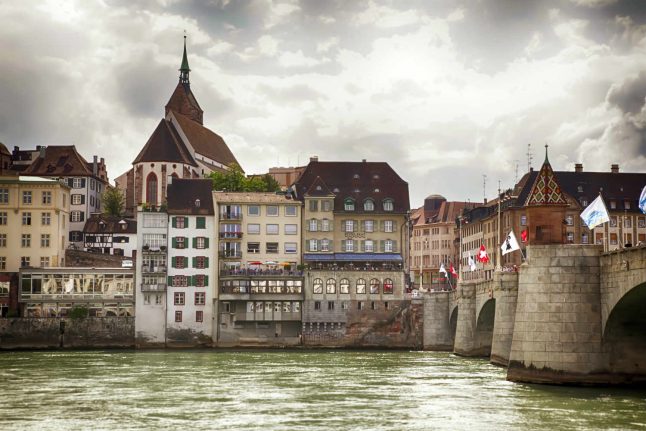Zug and Basel have roared up the charts in the latest list of global cities for the best expat living, finishing eighth and tenth respectively from over 80 cities and towns surveyed.
Quality of life was the major factor, along with safety, public transport and a lack of pollution.
The other Swiss cities to feature however ranked comparatively poorly, with Lausanne (36th), Bern (38th), Zurich (41st) and Lugano (53rd) – followed by the poorly performing Geneva in 69th.
Although all of the Swiss cities in the survey ranked in the top 20 for quality of life, those who found themselves further down the list had been ranked poorly for ability to integrate and potential for making new friends.
In Zurich and Bern, for instance, more than 50 percent of those surveyed said they found it difficult to make new friends.
'It's a lonely country to live in': What you think about life in Switzerland
Comparing the findings to the list from last year shows that Swiss cities are rising up the ranks.
In the 2018 edition, no cities in Switzerland made the top 20, with Basel and Zug coming in 22nd and 23rd respectively. Lausanne (44th), Geneva (56th) and Zurich (57th) were also included on the 2018 list.
Zug and Basel rise up the ranks
Although some respondents indicated that it was also difficult to make friends in Zug and Basel, the high ranking of these cities in all other major categories pushed them towards the top of the list.
In Zug, for instance, not one respondent indicated dissatisfaction with public transport, while work-life balance and the economy were also rated as among the best in the world.
As noted by the authors: “Zug is not only the highest-rated city in Switzerland, but it also offers the world’s best quality of life”.

Image: Depositphotos
“Expats even rank Zug first in the world for the state of the local economy (91% happy vs. 66% globally).”
Basel ranked highly on affordability of housing and overall quality of life.
As noted in the report: “Basel ranks 10th out of 82 cities in the Expat City Ranking, with expats rating the quality of life very highly (6th).”
“They are particularly happy with their personal safety (93% vs. 81% globally), the local transportation system (98% vs. 70% globally), and the quality of the environment (93% vs. 71% globally)”
The 2019 study
The study, completed by Internations, took into account 82 different cities across the world, interviewing 20,000 people from 178 countries with 187 nationalities.
Internations, a networking organisation for expats across the globe, publishes the list annually.
The study takes into account a variety of factors, including Quality of Urban Living, Getting Settled, Urban Work Life Balance, Finance and Housing, Cost of Living and Happiness.

Image: Internations
According to a statement from the authors, each factor has even weighting in the final outcome.
“Participants were asked to rate more than 25 different aspects of urban life abroad on a scale of one to seven. The rating process emphasised the respondents’ personal satisfaction with these aspects and considered both emotional topics as well as more factual aspects with equal weight.”
The minimum requirement for a city to be included in the list was 50 participants in order to ensure a wide range of respondents had the chance to have their say.
The good
Other than the two Swiss cities to feature in the top ten, the best cities as ranked by expats come primarily from Europe and Asia.
Four Asian cities – Taipei, Kuala Lumpur, Ho Chi Minh City and Singapore – make up the top four, with Montreal ranking fifth.
Lisbon (sixth), Barcelona (seventh) and The Hague (ninth) join Zug and Basel in the top ten.
…the bad and the ugly
Aside from Switzerland featuring prominently at the pointy end of the rankings, the list was also notable for which cities ranked the worst in the world among expats.
While Kuwait City had the unlucky honour of being ranked in the 82nd and last place on the list, some other cosmopolitan metropolises – many known for attracting workers from all over the world – were also among the worst of the worst.

Image: Internations
Second last on the list was Rome, with expats in the Italian capital criticising the city’s poor security situation, job prospects, political instability and high cost of living.
Another Italian city, Milan, ranked 80th on the list, with cost of living, work-life balance and political instability major factors.
Rounding out the bottom ten was Lagos (79th), Paris (78th), San Francisco (77th), Los Angeles (76th), Lima (75th), New York City (74th) and Yangon (73rd).
p.p1 {margin: 0.0px 0.0px 0.0px 0.0px; line-height: 14.0px; font: 12.0px Helvetica; min-height: 14.0px}
p.p2 {margin: 0.0px 0.0px 0.0px 0.0px; line-height: 14.0px; font: 12.0px Helvetica}
p.p3 {margin: 0.0px 0.0px 0.0px 0.0px; line-height: 14.0px; font: 12.0px Times; color: #0000e9; -webkit-text-stroke: #0000e9}
p.p4 {margin: 0.0px 0.0px 0.0px 0.0px; line-height: 14.0px; font: 12.0px Times; color: #0000e9}
span.s1 {text-decoration: underline ; font-kerning: none}
span.s2 {text-decoration: underline ; font-kerning: none; -webkit-text-stroke: 0px #000000}





 Please whitelist us to continue reading.
Please whitelist us to continue reading.
Member comments